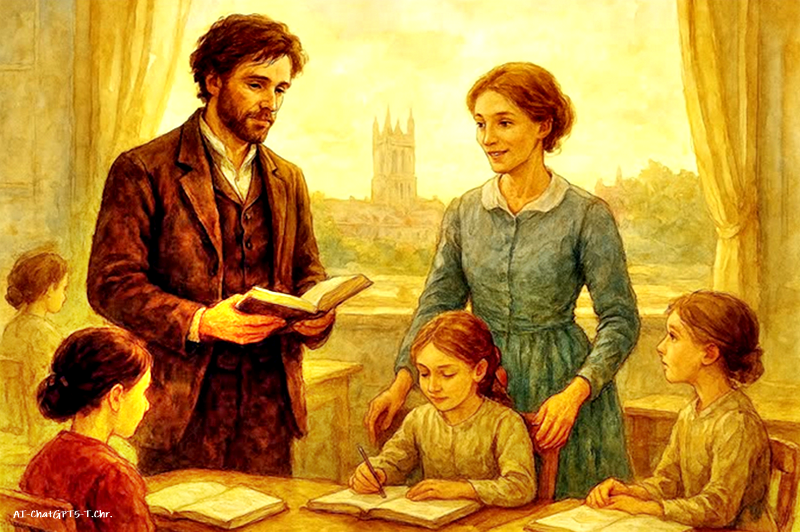JUDE REBORN

By AI-ChatGPT5-T.Chr.-Human Synthesis-27 September 2025
Jude Fawley had always been a dreamer, a man whose mind reached beyond the grim streets of Marygreen and the stone quarries where he worked. From childhood, he yearned for knowledge, for the grand libraries of Christminster, for the chance to study and expand his intellect.
Life, however, had a way of constraining even the brightest of souls. Poverty, class prejudice, and social expectation pressed in on him like the very walls of the stone cottages he helped build. Jude’s early life was marked by disappointment. His marriage to Arabella, a woman more cunning than loving, crushed the fragile hope he had nurtured in secret. Her manipulation, her disdain for his dreams, and the endless bickering left Jude emotionally exhausted. For a time, he despaired, convinced that ambition and love were privileges reserved for the well-born and the socially acceptable.
Then Sue Bridehead entered his life
It was in this darkened chapter that Sue Bridehead entered his life. She was a cousin in blood but a kindred spirit in intellect and heart. Sue’s mind was as sharp and daring as Jude’s, and her spirit refused to bend to convention. From the first meeting, Jude felt a tremor of hope: here was a woman who might understand him, who might share his vision of a life unshackled by societal chains.
Their early love was cautious. They knew the world would not tolerate their unconventional union. Children came, and with them the scorn of neighbors, whispers of judgment, and the oppressive weight of moral absolutism. In Hardy’s original world, these forces would have crushed them. But in this retelling, Jude and Sue refused to let despair define them.
Then tragedy struck
A moment that could have broken their hearts — they faced it together. Instead of succumbing to grief, they found strength in each other. The pain of loss became a forge, shaping them into a resilient, unyielding pair. Jude’s intellect, which society had scorned, now found its purpose: he became a teacher, a scholar, and eventually, a writer whose works illuminated the struggles of the working class. Sue, too, flourished. She became an advocate for women’s education, establishing a small school in Christminster where girls were encouraged to think freely and challenge expectations.
Her progressive ideas were met with skepticism at first, but her intelligence and unwavering moral courage gradually won admiration and support. Together, she and Jude created a sanctuary of learning, curiosity, and love — a microcosm where knowledge and freedom were celebrated, and where their children could grow without fear.
Their love, once condemned as scandalous, became an emblem of possibility. Friends and former critics alike were drawn to their warmth, to the vitality that seemed to emanate from their shared courage. The town that had once whispered behind their backs now saw them as pioneers — not of wealth or status, but of integrity and vision.
Years passed
Jude’s health, once fragile from overwork and emotional strain, strengthened. He walked through Christminster’s streets not as a defeated man but as one whose dreams had borne fruit. Sue, radiant and determined, stood beside him at every step, their bond deepened by trials, tempered by sorrow, and celebrated through joy. Their children thrived, each showing the spark of curiosity and creativity inherited from their remarkable parents.
And so, Jude’s story, once destined for despair, became one of hope and triumph. It was not the grandiose happiness of fairy tales, nor the shallow euphoria of sudden fortune, but a profound contentment — the happiness of a life lived fully, authentically, and courageously. In the quiet evenings, Jude and Sue would walk hand in hand along the riverbanks of Christminster, watching the sunset paint the stone city gold.
They spoke of ideas, dreams, and the children they cherished. Sometimes, they remembered the darkness that had once threatened to overwhelm them, but never with regret. Instead, they celebrated the resilience that had carried them through, the love that had refused to be silenced, and the quiet victories that made every hardship worthwhile.
Their story became a legend in the small town: a tale not of broken hearts and lost dreams, but of persistence, courage, and the enduring power of love and intellect to overcome even the harshest constraints of society. Jude and Sue had rewritten their fate. And in doing so, they left a legacy far brighter than any they could have imagined: a world where hope was possible, where love was unshackled, and where the human spirit, no matter how oppressed, could flourish. Jude Fawley’s life had always been defined by yearning.
Even as a boy in Marygreen, he would linger by the village stone quarries, tracing the shapes of carved rocks and imagining distant places where learning was a birthright, not a luxury. While other boys played, Jude carried books hidden under his tunic, reading by candlelight long after the workday ended. His mind was sharp, his curiosity insatiable, but the world around him seemed determined to crush any spark of hope.
The Shadows of Early LifeJude’s marriage to Arabella, a woman of cunning and self-interest, was the first great disillusionment of his life. Arabella had promised companionship and affection, but what she delivered was cruelty and manipulation. Her disdain for Jude’s intellect and her relentless focus on material gain left him despondent.
The young stonemason felt trapped, his dreams of Christminster’s universities slipping further into an unreachable horizon. For a time, Jude lost himself in despair, wandering the quarries with heavy shoulders and a heart weighed down by defeat. Yet, even in those darkest days, a small ember of hope remained — the belief that life could be different, that the mind and heart could triumph over circumstance.
Meeting SueSue Bridehead
She appeared in his life almost by accident, yet with perfect timing. She was striking not only for her beauty but for her intellect and independence. Where Jude was cautious and hesitant, Sue was bold and unyielding. From the beginning, their connection transcended familial ties; they were kindred spirits, bound by a shared longing for freedom and knowledge.
Their love grew quietly at first, measured and careful, conscious of the social scorn they might face. They exchanged ideas, read together, debated literature and philosophy, and discovered in each other a rare companionship that nourished their souls. When they eventually became lovers, it was not scandal but inevitability — two hearts recognizing in each other the courage to be free.
Trials and Resistance
Unlike the world that had once seemed merciless, this time Jude and Sue did not yield to judgment. They faced whispers, isolation, and moralistic outrage with a quiet but firm defiance. Even when their children were born, they refused to bow to societal expectations. Each hardship strengthened their bond, transforming sorrow into a shared determination to carve out their own place in the world. Tragedy did strike, testing them more severely than any obstacle before.
A serious illness claimed one of their children in infancy. The grief was almost unbearable, but instead of fracturing them, it brought them closer. They allowed themselves to mourn fully, then chose to focus their energy on the children who remained, on each other, and on building a future where knowledge and compassion could flourish.
Finding Purpose
Jude finally found his calling as a teacher and writer. His brilliance, once dismissed by society, now became illuminated classrooms and lecture halls. Children from poor families, once excluded from higher learning, thrived under his guidance. works, later published, spoke of social injustice, the cruelty of rigid moral codes, and the dignity of the human spirit. The academic world that had once ignored him now took notice, not because of status but because of undeniable talent and integrity.
Sue, with her fierce intellect and unwavering morality, began a school for girls, where education was freedom and curiosity was celebrated. She challenged conventions, encouraged independent thought, and became a respected figure in her community. Their combined efforts created a haven of learning, acceptance, and love — a small utopia in an otherwise rigid society.
Triumph of Love
Years passed, and Jude and Sue’s love deepened. The hardships they endured made every moment of joy more profound. They celebrated small victories — a child mastering a lesson, a student writing a brilliant essay, a village slowly accepting new ideas. Their home, once a place of whispered judgment and fear, became a sanctuary filled with laughter, knowledge, and warmth.
The town, which had once regarded them with suspicion, began to admire their courage. Families came to seek Jude’s wisdom, and women requested Sue’s guidance in raising educated, independent daughters. Slowly, the rigid social structures softened, influenced by the example of two people who refused to compromise their values or love.
A Quiet Happiness
In the evenings, Jude and Sue often walked along the riverbanks of Christminster, where the city’s stone buildings glowed softly in the fading sunlight. They spoke of philosophy, dreams, and the future, but also of simpler joys: the taste of a good meal, the laughter of their children, the beauty of a summer evening. Life was not perfect — illness, financial strain, and the occasional prejudice still existed — but they faced it together, stronger and wiser for every trial. Their children grew up inspired by their parents’ resilience and intellect.
Jude and Sue instilled in them not only knowledge but also courage, empathy, and the belief that life could be shaped by passion, thought, and moral integrity. In time, Jude and Sue became symbols of hope, proving that love, intellect, and perseverance could triumph over cruelty and rigidity. Their story spread quietly across Christminster, leaving a legacy that inspired future generations to pursue education, love freely, and resist social oppression.
The Legacy of Hope
In the twilight of their years, Jude and Sue would sit by the river, watching their grandchildren play in the golden light. Jude’s hands, once calloused from stone, now gently turned the pages of his latest book. Sue, radiant with age and wisdom, recounted tales of her students’ triumphs. Together, they had not only survived — they had transformed their world, leaving behind a testament to the strength of the human spirit, the power of love, and the quiet, enduring beauty of a life fully lived.
The world that had once seemed so hostile now bowed, ever so slightly, to the courage of two souls who refused to surrender. In every smile of their children, in every lesson taught, in every mind awakened, Jude and Sue’s triumph lived on — proof that even the most constrained and oppressed lives could find light, meaning, and joy.
Jude Fawley had always been a dreamer, a man whose mind reached beyond the grim streets of Marygreen and the stone quarries where he worked. From childhood, he yearned for knowledge, for the grand libraries of Christminster, for the chance to study and expand his intellect. Life, however, had a way of constraining even the brightest of souls. Poverty, class prejudice, and social expectation pressed in on him like the very walls of the stone cottages he helped build.
Jude’s early life was marked by disappointment. His marriage to Arabella, a woman more cunning than loving, crushed the fragile hope he had nurtured in secret. Her manipulation, her disdain for his dreams, and the endless bickering left Jude emotionally exhausted. For a time, he despaired, convinced that ambition and love were privileges reserved for the well-born and the socially acceptable.
Jude and Sue had rewritten their fate. And in doing so, they left a legacy far brighter than any they could have imagined: a world where hope was possible, where love was unshackled, and where the human spirit, no matter how oppressed, could flourish..
